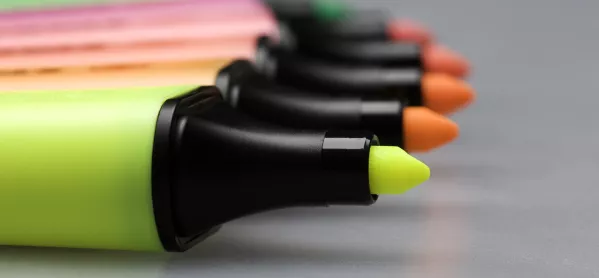- Home
- ‘Marking was the bane of my life. Until...’
‘Marking was the bane of my life. Until...’

Some years ago, I saw a cartoon in Tes which (from memory) depicted a small picture of a teacher in front of a whiteboard. Emanating from behind the board were some ghoulish figures holding clipboards and pens and the caption which said something about the "spectre of Ofsted".
I’ve never forgotten this cartoon as I have forged on with my teaching career, always feeling that, particularly when marking students’ work, we may also have half an eye on the fact that it is being written for an unseen and malevolent third party. Also, despite the wonderful workload noises made recently by the government and DfE, I am yet to hear of, let alone use, a strategy which makes feedback in any way less of a pain.
Marking books is a burden; fact. We take on this burden before we even sign on the dotted line for our ITT course.
As teachers, we are all looking for ways to make marking and feedback personalised, relevant and useful. Equally, we’d welcome any way of making this process more streamlined and less burdensome.
So it was (yet again) that I carried my Sainsbury’s bag for life full of 86 yellow exercise books to my car on the last day of term and then spent as much holiday time as possible on work-avoidance techniques (quality time with the wife and kids, socialising with people I hadn’t seen for a long time, catching up with odd jobs which had been waiting for me since October half term) over the Christmas recess.
However, this year (my 20th in teaching) there’s a difference: I have developed a pain in my writing hand that I can’t shift. It hurts to write and I can only put this down to the repetitive stress of marking student work. I am seeing the rheumatologist in March but that won’t stem the tide that is sitting in the bag in the hallway. Students are complaining more often that they can’t read my writing.
I truly believe that necessity is the mother of invention and these days, where you can turn on the heating from an app on your phone, get the news at the touch of a button and everything else is a click away, I knew there must be something which could help me in my hour of greatest need. And I was right: welcome, voice recognition. I speak; the machine writes. The new dawn has arrived.
I trawled the internet and found expensive, subscription-based software and scathing reviews of the ill-fated entrepreneur on Dragon’s Den all deemed useless, with strings attached or both. Feeling as deflated, I looked at my phone, opened the Notes app and saw the microphone button. Could it be that the solution to all my problems lay literally in the palm of my hand? Surely not.
I looked at one of the ‘WWW/EBI / Next Steps’ that I had written in a Year 8 book. With little hope of redemption, I pressed the microphone button and spoke what (I thought) I had written in the book. Like something out of a Harry Potter movie, the words appeared on the screen in (almost) perfect rendition. All of a sudden, the ghosts retreated behind the whiteboard.
After about an hour, I had "marked" a set of books. Once you are in the swing of it and remember to speak clearly, slowly and say punctuation marks (and even "smiley" emojis), it is quite quick to do. All I then did was email the note to myself, edit it in Word and print it off. Five minutes with a guillotine and each student had a label which they could read, gave them relevant guidance, followed policy and looked great. The only hiccup being when marking Marnie’s book, I had to shout up to the kids to "Get ready for bed now!" and this appeared as part of her "next steps" (note: proofreading is an integral part of the process).
I am not saying that new initiatives like T Marking, POP Testing and the like have no merit and won’t help to make our lives easier. Similarly, I’m not going to claim that marking is suddenly something I relish. And further down the road, it might not save me from a referral to occupational health.
But by using something like this, I’ve found – and I think you will too – a little extra time to "focus on teaching and your own development". It’s allowed me more time with my loved ones and on the more important things in life.
Ian Healey is a lead practitioner at Q3 Tipton in the West Midlands
Register with Tes and you can read two free articles every month plus you'll have access to our range of award-winning newsletters.
Keep reading with our special offer!
You’ve reached your limit of free articles this month.
- Unlimited access to all Tes magazine content
- Save your favourite articles and gift them to your colleagues
- Exclusive subscriber-only stories
- Over 200,000 archived articles
- Unlimited access to all Tes magazine content
- Save your favourite articles and gift them to your colleagues
- Exclusive subscriber-only stories
- Over 200,000 archived articles
